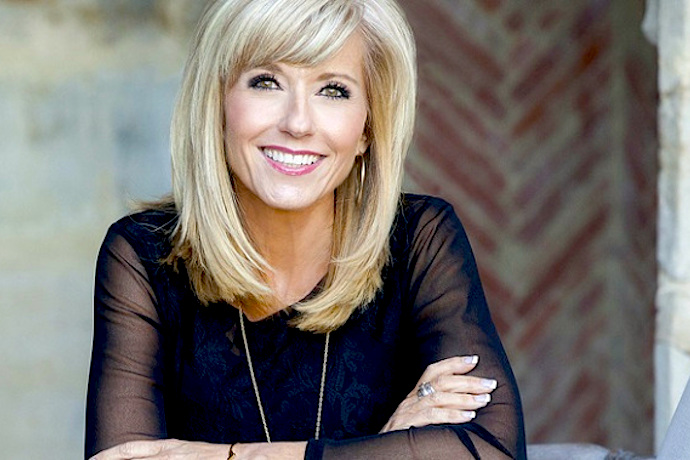The departure of evangelical superstar Beth Moore from the Southern Baptist Convention and its publishing arm Lifeway is seismic news for a particular brand of American Christianity. But it’s too early to tell if the shockwaves will last, or if they will spread across denominations or into the world of politics. It would be a mistake to fall into the common evangelical error of overestimating the impact of individual changes while simultaneously neglecting the importance of social trends.
A talented and charismatic teacher, speaker and writer, Moore helped a generation of evangelical women form identities, if not separate from men, then not quite beholden to them either. She had a knack for poking the right bears, as when a tweet of hers accidentally set off a major debate over women preaching in the SBC. Moore has also been an advocate for victims of sexual abuse, both inside the SBC and outside, and against former Pres. Donald Trump, whom she was aghast to discover was not rejected by her fellow evangelicals.
With nearly a million followers on Twitter and correspondingly large book sales, the importance of Moore’s decision to leave the SBC shouldn’t be dismissed. Some experts say it will lead many women to follow suit, which seems debatable. It will certainly hurt Lifeway’s sales, raise difficult questions in SBC circles, and deprive the conservative denomination of a prominent woman to shield them from accusations of sexism and inequality. That will particularly sting since the church is also caught in a lancing debate about critical race theory that has led prominent Black pastors to walk away from the denomination.
Being at the very least Trump-curious in recent years has done Southern Baptists no favors, in short. The denomination has already been in decline since 2006, but saw the biggest drop in membership in over 100 years between 2018 and 2019, losing 287,655 members, or 2% of its total. Moore and Black pastors leaving may or may not accelerate that trend, but it certainly won’t help.
Likewise, their departure may not do lasting damage to the SBC in the sense that it might not provoke successive waves of disaffiliation. (In other words, their followers could choose to leave, but it would be a more or less one-off event, not an ongoing phenomenon.) At the same time, people who leave the church tend not to return, and they certainly don’t bring their children back. In the context of a secularizing society, Baptists can’t afford to lose potential converts, much less core membership. This will hurt them.
The political implications of the story play out in the same vein. It’s far too early to assess the direct ramifications, of course. But if attitudes toward Covid vaccines are any proxy, it seems unlikely that Moore’s departure will have a very profound impact on Southern Baptist attitudes. There are many strands to the narrow-minded authoritarianism that drove Moore from the fold, and they will not dissipate overnight simply because one lay leader decided to leave, no matter how prominent she might be. Much more likely is that disaffiliation and political ossification will continue to work together. Those who can’t stand reactionary politics will vote with their feet, as Moore did, with the shrinking remainder moving steadily to the right. We’ll know if that’s the case in a few years.
So the Moore decision is not without significance, even if it is attenuated. Will it affect American Christianity more broadly? That’s a bit more difficult to argue. In fact, this story seems illustrative of the idea that there’s really not one single Christianity in the U.S., but multiple, often competing Christianities.
Forgive a bit of inside baseball to help understand why. As mentioned above, Moore wrote for Lifeway, the SBC’s denominational publishing company; according to Bob Smietana, it was known as the Baptist Sunday School Board into the 1990s. This was a fairly common practice among American churches: the Lutherans had Augsburg and Fortress Press, the Methodists had Cokesbury, and so on. Like Lifeway, Augsburg and Cokesbury also had a chain of religious bookstores, but all three have folded in recent years. Amazon and changing market conditions did them in just like countless independent bookstores.
The difference is that Augsburg Fortress and Cokesbury stores stocked books across the mainline Protestant spectrum: Lutheran and Methodist and Episcopal and Presbyterian and UCC. But they didn’t carry books by Lifeway, and as far as I know, Lifeway didn’t carry theirs. Nor did Lifeway books turn up on the all-important book tables at mainline gatherings. Whether as a cause or result of this situation, most mainline clergy don’t read much evangelical material, if any at all, and likewise, most evangelicals tend not to read mainline books or journals. (Catholics tend to be on their own wavelength entirely, in part because there is so much material within their own tradition.)
Rightly or wrongly, the faith is pretty fragmented, in other words. So while Moore’s defection from the SBC is interesting, and significant for those who care, it may not be very meaningful to leaders in other denominations, unless one of their congregants happens to be a fan of hers. If you’re ever tempted to ask why American Christians can’t get one another to toe some line or another of basic human decency, just remember this: I don’t read Beth Moore, and other than some writers and journalists whose job it is to do so, I don’t know anyone who does. And if you wonder what effect her departure will have, remember this: before very long, that’s going to be the case in the Southern Baptist Convention as well.





